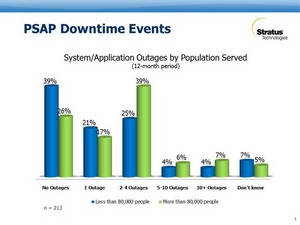MAYNARD, MA--(Marketwire - Dec 11, 2012) - Few mission-critical applications are more self-defining than emergency dispatch operations. An outage in a public safety answering point (PSAP) can translate into dropped 9-1-1 calls, slowed response times, and incomplete information to first responders. Yet, 72% of PSAPs serving populations of more than 80,000 citizens experienced downtime in the past 12 months; 50% had 2-4 outages and 11% had more than five. PSAPs in communities of less than 80,000 fared somewhat better, with six out of 10 suffering downtime at least once in the past year.
These are some of the findings from an October 2012 survey of 390 PSAP professionals conducted by Stratus Technologies, a global provider of products and services focused on protecting critical applications from system downtime. Respondents identified themselves according to job responsibility, size of population served, and geographic entity -- town/city, county, metro, multi-county and state; town/city and county accounted for 83% of respondents.
In addition to the number of incidents, respondents reported on the duration of downtime per incident. Fifty-seven percent of outages lasted at least 15 minutes and 26% stretched beyond an hour. One hour of downtime could potentially affect six 9-1-1 calls at a PSAP handling 50,000 calls annually, or 29 calls at an annual volume of 250,000. The number of calls affected could be higher or lower at various times of day.
Asked about their preparedness for natural disasters or catastrophic outages, 29% said they had no formal disaster recovery/contingency plan or, just as disconcerting, did not know if a plan existed. Another 25% said they did not have or were uncertain about a back-up location for restarting dispatch operations in the event of a primary-site failure.
"First responders need to know that every time a call comes in they'll have the correct information, the most direct routing, and all the details they need to handle the incident whether it's a break-in, a heart attack, or a house fire," said Dave LeClair, Stratus director of product management and marketing. "PSAPs deal with emergencies 24/7. Server downtime should not be one of them. If the server is down even for a few minutes, it affects everyone's ability to do their job, to protect the community and to save lives."
Leading software providers of computer-aided dispatch, records management, and mobility applications collaborate with Stratus to deliver a complete PSAP solution that includes industry-leading high-availability and fault-tolerant computing platforms. Stratus systems are installed in hundreds of emergency dispatch operations in the U.S., Canada, Great Britain, and Asia/Pacific.
Download a copy of the survey results here.
About Stratus Technologies
Stratus delivers the world's only proactive availability guarantee for the platforms that run the most vital functions of commerce, public safety, manufacturing, financial services, and healthcare. Combining patented software and hardware technologies with thirty years of unparalleled remote monitoring and management expertise for availability, Stratus helps save lives and protect the business and reputations of companies, institutions, and governments the world over. To learn more about worry-free computing, visit www.stratus.com.
© 2012 Stratus Technologies Bermuda Ltd. All rights reserved.
Stratus is a registered trademark of Stratus Technologies Bermuda Ltd. The Stratus Technologies logo is a trademark of Stratus Technologies Bermuda Ltd. All other marks are the property of their respective owners.
Contact Information:
Contact:
Ken Donoghue
Stratus Technologies
978-461-7269
ken.donoghue@stratus.com
www.stratus.com
